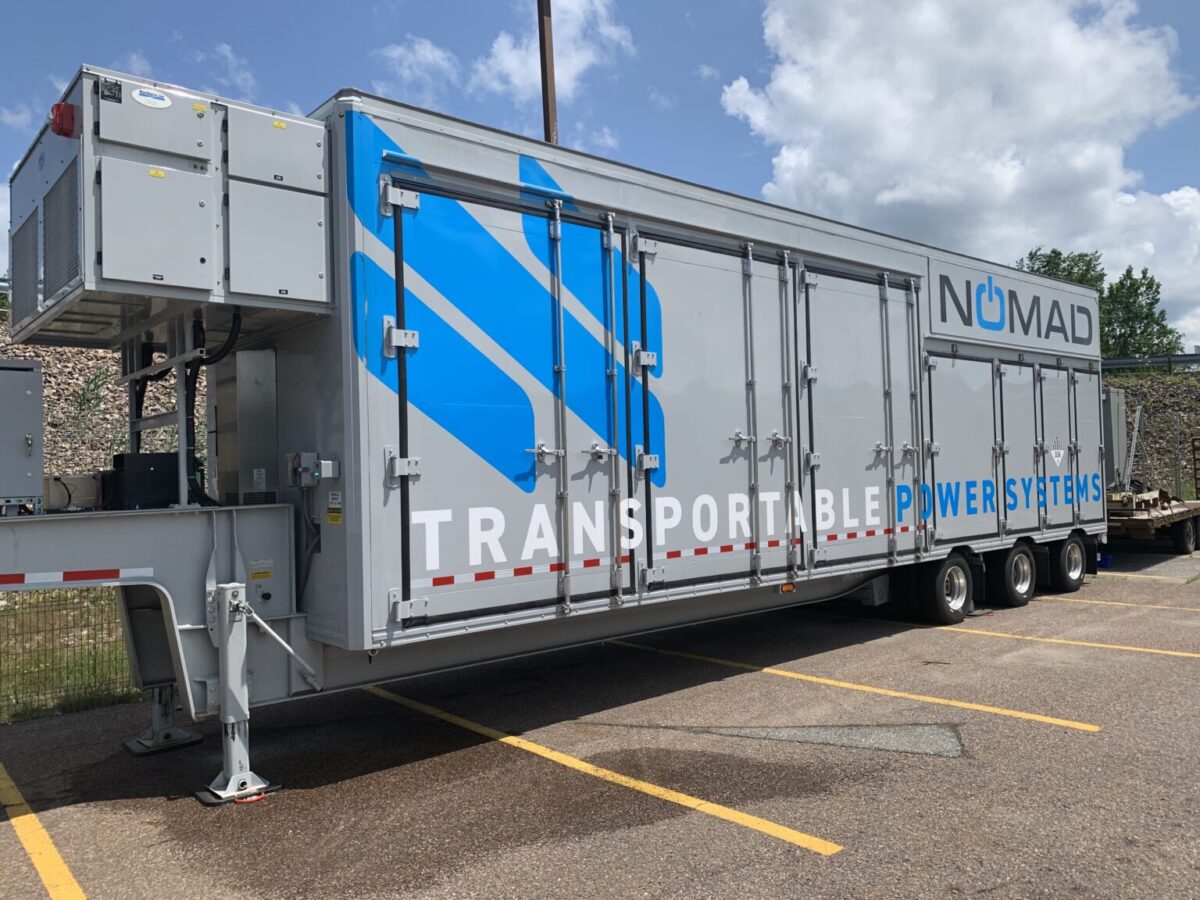From pv magazine USA
The Nomad mobile energy storage system from Vermont-based Nomad Transportable Power Systems is a lithium-ion-based battery energy storage system (BESS) developed by Kore Power. The energy system, called the Traveler, provides 1 MW (AC) with 2 MWh of storage capacity and can be connected to the grid or powered by renewables, adding to its portability. The system comes in a BESS trailer and includes a standardized docking platform capable of interconnection with any distribution or transmission utility, according to Nomad.
Green Mountain Power (GMP) , a utility in Vermont that provides electricity that’s 100% carbon free and 78% renewable, reports that it received the first Nomad BESS manufactured by the Vermont company. GMP recently deployed the BESS to keep Twincraft Skincare’s manufacturing facility from going down during routine power system maintenance. GMP estimates that the scheduled maintenance would have otherwise required a 6-hour outage for line crew safety.
“This is an incredible advancement in technology for GMP customers, and we are very excited to be part of its first commercial deployment here at Twincraft Skincare,” said David Speed, vice president of engineering at Twincraft. “We recognize that disruptions are a normal course of business, but they are just that, disruptions, and to avoid them in the future by using clean energy stored in the NOMAD mobile battery storage system will absolutely help us stay competitive in the market with greater reliability of operations and will keep our employees on the job.”
Like many utilities, GMP schedules outages for maintenance and upgrades, and they usually choose times that will have the least impact for customers. However, with manufacturing running 24 hours a day at Twincraft, a low-impact time was not an option.
Prior to the installation, GMP engineers calculated the electrical load needed to keep Twincraft powered by the BESS for the duration of the outage. The Nomad Traveler then backfed a transformer nearby to re-energize a small section of the power distribution system that was powering the facility.
Popular content
“The Nomad is a great new tool for strategic deployment across the state, and there are several scenarios where we can now provide even greater reliability for customers both residential and commercial,” said Mari McClure, president and CEO of GMP. “From powering a fire department during a storm, to operating a ski lift, to keeping a cluster of homes powered-up, to supporting local businesses like Twincraft, there are so many opportunities to enhance safety, support commerce, and protect customers.”
With a $9.5 million grant from the US Department of Energy, GMP and Nomad plan to expand this clean-technology even more by bringing long-duration energy storage to five communities in rural Vermont. The funding is part of the US Department of Energy’s Long-Duration Energy Storage (LDES) Demonstration Grant Program, supported by the 2020 Energy Act. The program intends to provide up to $350 million for emerging LDES demonstration projects, both lithium and non-lithium-based, capable of delivering electricity for 10 to 24 hours or longer. DOE will provide financial assistance through cooperative agreements to fund up to 50% of the cost of each project.
The grant funding will help support the roll out of Nomad energy storage systems, part of GMP’s Resiliency Zone program, to Panton, Brattleboro, Grafton and Rochester. The intention is to use the energy storage systems to help lower costs for customers by using the stored energy in the battery system during peak power use times such as during heatwaves, rather than pulling in more energy from the grid.
“We are so excited to continue rapidly growing battery storage in Vermont to keep everyone powered up through extreme weather,” said Mari McClure, GMP’s president and CEO. “The Nomad is a flexible mobile tool that keeps communities connected, while also cutting carbon and costs for all.”
For the community resilience projects, Nomad will build a new, mobile, long-duration energy storage solution using Kore Power’s next-gen modules. Nomad expects each unit to be capable of providing power to about 50 homes for 10 hours. The new units will also incorporate electric vehicle (EV) charging capabilities so that electric vehicles in outage-stricken communities will have access to power.
This content is protected by copyright and may not be reused. If you want to cooperate with us and would like to reuse some of our content, please contact: editors@pv-magazine.com.



1 comment
By submitting this form you agree to pv magazine using your data for the purposes of publishing your comment.
Your personal data will only be disclosed or otherwise transmitted to third parties for the purposes of spam filtering or if this is necessary for technical maintenance of the website. Any other transfer to third parties will not take place unless this is justified on the basis of applicable data protection regulations or if pv magazine is legally obliged to do so.
You may revoke this consent at any time with effect for the future, in which case your personal data will be deleted immediately. Otherwise, your data will be deleted if pv magazine has processed your request or the purpose of data storage is fulfilled.
Further information on data privacy can be found in our Data Protection Policy.